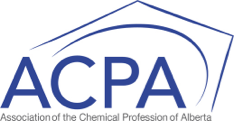Frequently Asked Questions
1. Why should I renew my membership?
Although regulatory status is not mandatory for chemists at this time in Canada (except in Quebec), requirements for professional chemist qualifications are increasingly appearing across the country in job ads and in requirements for promotions. We are slowly starting to see broader opportunities and more pay equity for chemists as well. Growing awareness of chemical professionals is partly fuelled by the Agreement on Internal Trade (AIT) signed by the federal and provincial governments a few years ago. This agreement says that anyone who has earned a professional designation in one province, should be accepted as that type of a professional in all other provinces. The AIT is intended to allow the easy movement across the country of doctors, engineers, chemists, and all other kinds of professional workers.
Furthermore, the ACPA needs the support of all qualified chemists in continuing to build public recognition and to strive for better job opportunities for members of the chemistry profession.
2. I'm going on leave and I might have trouble getting enough PDC's this year. Why can't I just skip this year and renew again next year?
For most chemists, getting enough credits is not an issue. If you have previously been working full time in the practice of chemistry, you will have far more than the minimum requirement of 1200 hours over 3 years and can carry forward the excess credits into the year of your leave of absence. You can also recieve credits for reading technical literature, attending courses or conferences, judging at science fairs, volunteering for the ACPA and so on.
If you are still short of credits, you can complete the Request for Extension section of your PDC form, declaring your intent to make up for any deficit hours over the next two credit years.
3. If I don't renew now, can't I just rejoin at a later date?
It is certainly your choice on whether to renew now or not, and you can certainly apply to rejoin again later.
However, please note that if you do choose to drop your membership, you must destroy all business cards that include the P.Chem. designation, remove your P.Chem. designation from all current websites and other media, and refrain from using the P.Chem. title in any way. You must also return your P.Chem. certificate and stamp to the ACPA office.
The ACPA would be happy to welcome you back as a member at any time in the future. However, you must reapply as a new applicant and pay the regular application fee in effect at that time. Unfortunately, you may also be required to resubmit some or all of your original documentation as your application will have to be evaluated against the membership criteria at the time of your reapplication.
4. My employer doesn't pay my membership dues. Can I claim them on my tax form?
Yes, you can. Your membership fees are entered on Line 212 of your T1 General under annual union, professional or like dues. Your fees are subtracted directly from your income to calculate your net income.
5. I would like to join the ACPA. What do I need to apply?
The ACPA has various membership categories depending on your education and experience. To download our application checklist, click here.
6. I am no longer working as a chemist and would like to terminate my membership. How do I do that?
If you need to terminate your membership for any reason, sign into your account on our ACPA Membership Menu and select Renew Membership. You should see buttons to Pay Membership Fees or to Request Termination. This will send an email to the ACPA office. Please remember to state your reason for wanting to terminate your membership.
Please note that once your membership is terminated, you must remove the title (P.Chem., C.I.T., etc) from all business cards and refrain from using your title. Your stamp must also be returned to the ACPA office. You are liable for any misuse of your stamp until it is back in the possession of the ACPA office.
7. What does it mean to be a regulated profession?
Do you know the difference between organizations like the ACPA and the Chemical Institute of Canada?
The ACPA is a self-regulated profession. That means that an act of the Alberta legislature has granted the association the legal authority to set standards for who may enter the profession, to set standards of practice for those who work in the profession, and the right to create rules for when and how members may be sanctioned or removed from the profession. The primary purpose of a regulatory body such as the ACPA is to protect the public from incompetent or unethical practitioners of chemistry.
The Chemical Institute of Canada (CIC) is best described as a learned or scholarly society. It exists to promote an academic discipline or profession by providing networking opportunities, publishing information, conducting research, and staging conferences, seminars and workshops. The association is accountable to its members and has no legislated status.
Both organizations perform useful and complimentary roles but they serve different masters. The regulatory body is there to serve the interest of the public; the learned society is there to serve the interest of its members. They are not the same, and the potential for conflict of interest between the two mandates often requires government to separate the two types of associations.
In Canada, the regulation of professions derives from provincial authorities.
REFERENCE: Balthazard, Claude, What Does It Mean to Be Regulated?, Human Resources Professionals Association, 2010
REFERENCE: Balthazard, Claude, What Does It Mean to be a Regulated Profession?, Human Resources Professionals Association, 2015
